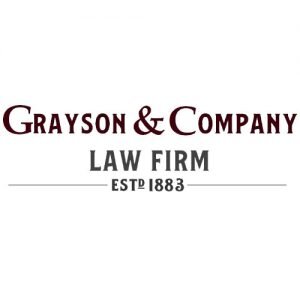Best Landlord & Tenant Lawyers in Moose Jaw
Share your needs with us, get contacted by law firms.
Free. Takes 2 min.
Free Guide to Hiring a Real Estate Lawyer
List of the best lawyers in Moose Jaw, Canada
About Landlord & Tenant Law in Moose Jaw, Canada
Landlord and tenant law in Moose Jaw, Saskatchewan, is designed to regulate the relationships between landlords and tenants, outlining their respective rights and responsibilities. The primary goal is to ensure that both parties are treated fairly, have access to proper dispute resolution, and understand their legal obligations. Whether you are renting a house, apartment, or commercial space, provincial legislation sets out the framework for leases, rent payments, maintenance, and other aspects of tenancy. The key legislation governing residential tenancies in Moose Jaw is the Residential Tenancies Act, 2006.
Why You May Need a Lawyer
People often seek legal advice in landlord and tenant matters due to a variety of common scenarios, including:
- Evictions: Facing the threat of eviction or needing to evict a tenant requires a careful understanding of legal procedures.
- Rent Disputes: Disagreements over rent increases, unpaid rent, or return of security deposits can benefit from legal input.
- Lease Agreements: Drafting, reviewing, or disputing lease terms may require expert interpretation to avoid costly mistakes.
- Property Maintenance Issues: Disputes about who is responsible for repairs or chronic maintenance issues often need professional guidance.
- Breaking a Lease: Understanding your rights and obligations if you need to terminate a lease early.
- Discrimination or Harassment: Addressing concerns regarding unfair treatment, harassment, or privacy violations.
- Disputes Over Damage or Cleanliness: Handling disagreements regarding property condition, cleanliness, or post-tenancy damage.
Legal representation or at least professional advice can help protect your interests, ensure compliance with the law, and reduce stress during disputes.
Local Laws Overview
Moose Jaw, as part of Saskatchewan, follows the province’s regulations regarding landlord and tenant issues, most notably the Residential Tenancies Act, 2006. Key aspects include:
- Security Deposits: Landlords can request a security deposit of up to one month’s rent. The deposit must be held in trust and returned within 7 business days after the end of the tenancy, minus any deductions for damages beyond normal wear and tear.
- Rent Increases: Landlords must provide at least two months’ written notice before increasing rent, and rent can usually only be raised once per year unless the unit is unregulated.
- Notice Requirements: Both landlords and tenants must give proper written notice to end a tenancy - one full rental period for month-to-month tenancies unless otherwise specified in the lease or by law.
- Eviction: Landlords cannot evict tenants without cause. Valid reasons include unpaid rent, significant property damage, or breach of lease terms. Proper notice and procedures must be followed.
- Maintenance: Landlords are responsible for maintaining the rental in a good state of repair, ensuring it is safe and habitable.
- Privacy: Landlords must give adequate notice (usually 24 hours) before entering a tenant’s unit, except in emergencies.
- Dispute Resolution: The Office of Residential Tenancies (ORT) handles landlord and tenant disputes efficiently and affordably compared to traditional courts.
Frequently Asked Questions
Do I need a written lease to rent in Moose Jaw?
It is not required by law to have a written lease for residential tenancies in Saskatchewan; oral agreements are valid. However, a written agreement is highly recommended to clearly outline obligations and reduce misunderstandings.
How much can a landlord charge for a security deposit?
A landlord can request a security deposit up to a maximum of one month’s rent for a residential rental unit. The deposit must be held in trust and properly accounted for.
How much notice is required to end a month-to-month tenancy?
Generally, either party must provide one full rental period’s written notice. For example, if rent is paid monthly, at least one month's notice is required before the end of the tenancy.
What should I do if my landlord won't fix something in my unit?
Notify your landlord in writing about the needed repairs. If unresolved, you can apply to the Office of Residential Tenancies (ORT) for enforcement, and possibly withhold rent until repairs are completed (consult legal advice first).
How do I dispute a rent increase I believe is unfair?
You can file an application with the ORT to review the rent increase for compliance with local rules. It may not be valid if it does not follow correct notice periods or exceeds regulated limits.
If a tenant refuses to leave after eviction, what can a landlord do?
Landlords must apply to the ORT for an official order of possession before involving the sheriff or law enforcement to remove a tenant. Self-help evictions are not legal.
Can a landlord enter my home without permission?
No, other than emergencies. In all other cases, landlords must provide at least 24 hours’ written notice before entering the property.
Am I responsible for damages caused by my guests?
Yes, tenants are generally responsible for any damage done by themselves or their guests beyond normal wear and tear.
How long does it take to resolve disputes through the ORT?
Many disputes are resolved within weeks of application, although complex cases may take longer. The ORT provides an efficient alternative to the courts for most residential tenancy matters.
Can I end my lease early?
You may be able to end your lease early with landlord consent or if special circumstances apply (such as domestic violence provisions). Review your lease and consult with the ORT or a lawyer before taking action.
Additional Resources
If you need more information or assistance regarding landlord and tenant matters in Moose Jaw, consider these resources:
- Office of Residential Tenancies (ORT): The main provincial body that resolves disputes, provides resources, and oversees landlord and tenant issues.
- Saskatchewan Justice - Public Legal Education Association (PLEA): Offers easy-to-understand guides, workshops, and information on tenancy law.
- Community Legal Assistance Services for Saskatoon Inner City (CLASSIC): While based in Saskatoon, they offer guidance and sometimes remote support across the province.
- Saskatchewan Landlord Association (SKLA): Provides resources, education, and support for landlords.
- Moose Jaw Legal Aid Office: Offers legal advice and representation for qualifying individuals in civil (including tenancy) matters.
Next Steps
If you need legal assistance in a landlord and tenant dispute or have questions about your rights:
- Gather all relevant documents, including your lease, correspondence with the other party, and any notices you have received or sent.
- Document your concerns by keeping a written record and taking photos if relevant (e.g., property condition).
- Contact the Office of Residential Tenancies (ORT) for advice or to file a formal application if your issue cannot be resolved directly with the other party.
- Consult with a local lawyer experienced in landlord and tenant law for personalized advice, especially in complex or high-stakes situations.
- Seek out community resources or legal clinics if you require affordable or free legal support.
Being proactive and informed is the best way to protect your interests in any rental or tenancy matter in Moose Jaw.
Lawzana helps you find the best lawyers and law firms in Moose Jaw through a curated and pre-screened list of qualified legal professionals. Our platform offers rankings and detailed profiles of attorneys and law firms, allowing you to compare based on practice areas, including Landlord & Tenant, experience, and client feedback.
Each profile includes a description of the firm's areas of practice, client reviews, team members and partners, year of establishment, spoken languages, office locations, contact information, social media presence, and any published articles or resources. Most firms on our platform speak English and are experienced in both local and international legal matters.
Get a quote from top-rated law firms in Moose Jaw, Canada — quickly, securely, and without unnecessary hassle.
Disclaimer:
The information provided on this page is for general informational purposes only and does not constitute legal advice. While we strive to ensure the accuracy and relevance of the content, legal information may change over time, and interpretations of the law can vary. You should always consult with a qualified legal professional for advice specific to your situation.
We disclaim all liability for actions taken or not taken based on the content of this page. If you believe any information is incorrect or outdated, please contact us, and we will review and update it where appropriate.










